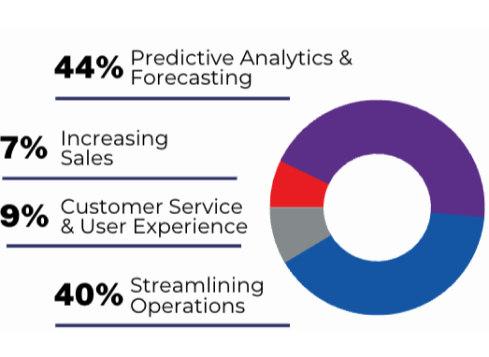
The recent BLUEPRINT 4D trade show for Oracle users brought together industry leaders and partners learn and collaborate on the latest in Oracle products and business technology. During the event, attendees were asked a daily question about either their use of AI, their cloud strategy, or overall user experience (UX).
In this first report, we will focus on the first question: "How are you using AI to transform your business?" Let's delve into the responses provided by 70 respondents and uncover valuable insights that can help you think about your business differently.
Summary
- While the number of respondents is not large, the distribution of AI utilization across the variouscategories provides valuable insights into current trends and priorities.
-
The focus on predictive analytics and forecasting indicates a strong emphasis on data-driven decision- making, empowering organizations to stay ahead in a rapidly changing market.
-
The significant percentage of respondents utilizing AI for streamlining operations highlights the growing recognition of AI's potential to optimize internal processes and maximize resource allocation.
-
The smaller percentage of respondents using AI for customer service and UX suggests that there is room for businesses to explore further opportunities in this area, as enhanced customer experiences can lead to increased loyalty and brand advocacy.
Insights From Blueprint 4D
44%
Predictive Analytics & Forecasting
The integration of AI into ERP systems for predictive analytics and forecasting offers a powerful insight into the evolving landscape of business intelligence. By leveraging AI's advanced algorithms and machine learning capabilities, companies gain the ability to analyze vast amounts of data, detect hidden patterns, and generate accurate predictions. This empowers organizations to make proactive decisions, anticipate market trends, optimize resource allocation, and mitigate risks effectively. The adoption of AI in ERPs for predictive analytics and forecasting represents a paradigm shift in strategic planning, enabling businesses to stay ahead of the curve and make informed, data-driven decisions that drive sustainable growth and competitive advantage. With AI as a crucial tool, companies can unlock valuable insights from their data and unleash the true potential of their ERP systems, propelling them towards a future where predictive analytics becomes a fundamental driver of success.
40%
Streamlining Operations
The utilization of AI within an ERP system to streamline operations presents a compelling opportunity for process optimization and efficiency enhancement. By incorporating AI's intelligent automation capabilities, companies can automate routine and repetitive tasks, reduce manual intervention, and expedite decision-making processes. AI-powered ERP systems can analyze vast amounts of data in real-time, enabling organizations to identify bottlenecks, streamline workflows, and allocate resources effectively. This not only improves operational efficiency but also frees up valuable human resources to focus on more strategic and value- added activities. With AI driving operational streamlining in ERPs, companies can achieve significant cost savings, enhance productivity, and gain a competitive edge in today's fast-paced business landscape. By leveraging the power of AI, companies can embark on a transformative journey towards leaner, more agile operations, paving the way for sustainable growth and improved customer satisfaction.
9%
Customer Service & UX
Leveraging AI to elevate customer service and optimize user experience (UX) truly opens door of possibilities for personalized interactions and seamless engagement. By harnessing AI's natural language processing, machine learning, and sentiment analysis capabilities, companies can provide exceptional customer service across various touchpoints. AI-powered chatbots and virtual assistants enable businesses to offer round-the-clock support, instantly respond to customer inquiries, and provide personalized recommendations. Additionally, AI-driven analytics can analyze customer data to understand preferences, anticipate needs, and deliver tailored experiences, resulting in increased customer satisfaction and loyalty. With AI empowering ERP systems for customer service and UX, organizations can elevate their brand image, build stronger relationships with customers, and gain a competitive edge in the marketplace. By putting the customer at the center of their operations and leveraging AI's capabilities, companies can unlock new avenues for growth, foster customer advocacy, and drive remarkable business success.
7%
Increasing Sales
Finally, harnessing the power of AI within ERP systems to drive sales growth, revenue generation and business expansion might be the most appealing conversation for executives today. By utilizing AI algorithms, companies can analyze vast amounts of customer data, identify patterns, and make accurate predictions to boost sales performance. AI-powered lead scoring and prioritization enable sales teams to focus their efforts on high-potential prospects, resulting in increased efficiency and improved conversion rates. Furthermore, AI enables personalized sales recommendations, leveraging customer insights to deliver tailored solutions that resonate with individual preferences. With AI as a strategic ally, ERP systems empower sales teams to make data-driven decisions, optimize sales strategies, and seize opportunities that drive revenue growth. The adoption of AI within ERP for increasing sales signals a new era where businesses can leverage advanced technologies to achieve remarkable results and surpass their sales targets.

